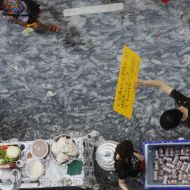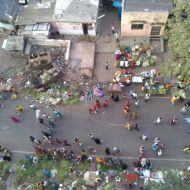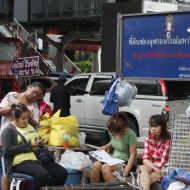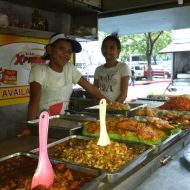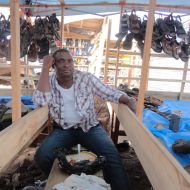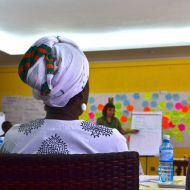School Attendance, Rainwater and Other Keys to Accra’s Future
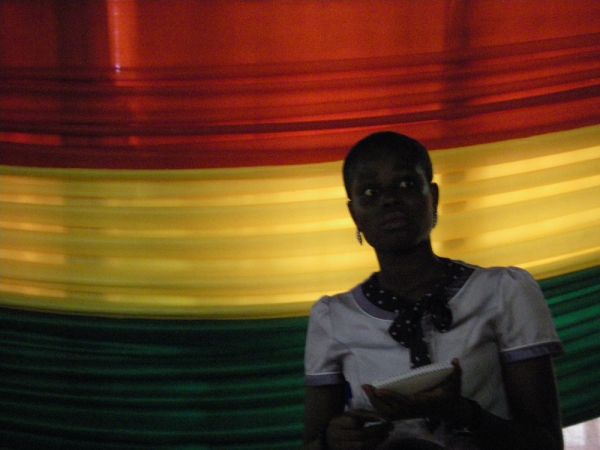
A participant from Accra’s formal sector presents at the Innovations Workshops. Photo credit: Sharon Benzoni
Following on the heels of the Futures Workshops, the Informal City Dialogues’ Innovation Workshops are unfolding in our six partner cities. Click here to read about the Innovation process.
***
First, dream. Then make your dreams come true.
That, at least, was the goal of the Informal City Dialogues Inclusive Innovation Workshop in Accra. After the free-wheeling dreaming of the Futures Workshop, the two days of Innovation sessions quickly took on the low buzz of serious concentration. Turning dreams into reality is hard work. “Even imagining [the future of a city] is an honorable struggle,” Sheila Ochuboju of the African Center for Economic Transformation (ACET) told the group as they began. But it was important that they do the work, she continued, because “no one will care about your problems as much as you do.”
After the opening ceremonies, Ariel Muller, facilitator from Forum for the Future, set the stage for the next few days. The participants would be coming up with solutions to create a future Accra that would be both resilient and inclusive. She invited the four teams to review the four future scenarios developed from the March Futures Workshops. Each placed the same character, 42-year-old Nii-Armah of Ga Mashie, in one of four possible future Accras, ranging from inequitable and unstable to prosperous and equitable. One Nii-Armah woke up in a high-tech house in the well-planned and inclusive community of Nima, where he grew up. Another woke up to see high-rises in his native James Town overshadowing his tiny shack. Consider, Ariel told them, what your character would say if he walked into the room today, in 2013. What advice would he give us?
By this time, a month after the first round of workshops, there were nicknames, inside jokes. “Obama’s First Lady,” a middle-aged woman from the 80,000-strong slum community of Nima, had become something of a class clown. People felt free to riff on the call-and-response chants, “Changemakers!” and “Agents of Change!” On the second day, obviously tired, the group’s response was a little lackluster. Kojo Anani of the People’s Dialogue, who was leading the chant, cocked his head, teasing them: “Oh? You don’t want change? You don’t want to change your communities?” They bucked up, buckled down.
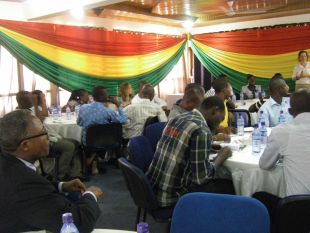
Participants spent two days creating innovations for the future of their city. Photo credit: Sharon Benzoni
This – the soft stuff, the stuff that’s hard to quantify, the stuff that may be described by academics or development experts as thick social networks, as social capital – may be one of the most important legacies of the process. The people from Ga Mashie, an indigenous Ga area, are bent low over the table, earnestly discussing educational reform with people from Old Fadama, a settlement located on land that is traditionally Ga. Land conflict forgotten, they are talking about their common problems, and, more importantly, how to solve them. They have jokes to share. They engaged in a process of change together. And more importantly, they struggled not only with imagining their cities, but finding the solutions.
To understand why this is so critical, consider the words of Ghana’s Former First Lady Naadu Atta-Mills, who presided over the first half-day of the Innovation Workshops, when the focus was still on dreams:
Many of our young people are not imagining themselves as future astronauts, Nobel Prize winners, or the next technological geniuses like Steve Jobs or Bill Gates. No, many of our young people born into generations of poverty today are simply dreaming of getting access to running water, so they don’t have to carry water on their heads every morning; they dream of having toilets in their houses, so they don’t have to be afraid to go to public toilets at night; they want lights in their homes so they can read and do their homework without straining their eyes. Poverty can destroy many things. It can rob us of our opportunities. And sometimes it can steal our dreams.
These stolen dreams were clearly evident in the videos of the finalists in the Accra Future-Now Video Competition. The videos were short messages recorded by ACET from participants who live in three of Accra’s slum communities. Over and over, people spoke of the need for water, for schools. They spoke of disparity: “We are not equal, all of us,” said Razak Akufo, who also imagined parks and ballfields where children could play.
But Farouk Arongo, 19, the winner of the competition, managed to hang on to big ideas, despite the challenges of his life in crowded Nima. “By 2040,” he said, “the next president should come from this community. The next Minister of Parliament. The next UN Secretary-General. We need to transform this community for the better.”
This spirit of transformation drove the next two days of hard work.
The solutions, not surprisingly, lay in understanding the problems. Working backward from their future Accras, each group identified the problems of Accra 2013, and chose, by consensus, one to focus on: Education, policy, energy, small- and medium-sized enterprise. In one scenario, the most hopeful, Nii-Armah’s happy life had been made that way by “a high level of social awareness” that drove residents to organize and push policy change, so that became the issue this team decided to focus on. In another, entrepreneurial spirit created a certain amount of resilience among Accra residents despite their challenges; with a boost, the group reasoned, these enterprises could transform the city.
Next came the innovations.
As inspiration, Ariel shared stories of famous Ghanaian innovators. One woman, one of the few who have successfully transitioned her business for the informal sector to the formal, shared her own story. As a young woman with a formal sector job but an entrepreneurial spirit, she started selling fried plantain chips on the side. With the help of a family advisor and investor, she began packaging the chips. Now she has a factory that employs dozens of Ghanaians. One little twist, and success was well within her reach.
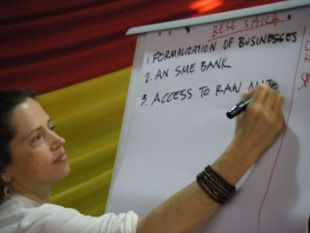
Forum for the Future’s Ariel Muller records the groups’ ideas. Photo credit: Sharon Benzoni
Still, innovation is not easy, no matter how inspired you are. The groups came up with many solutions, but struggled to generate with novel ideas. The education group talked about setting up ICT centers: “We are in the morning of technology,” said Ali Okere, 35, of Nima. “A lot of things are happening.” This, like many of the other ideas, is already being tried. Others were too reliant on government intervention, not truly engaging the informal sector. But Ariel, with the help of Farouk Bramaiah from the People’s Dialogue, pushed. “What is an innovation?” Farouk asked them. “Tell me what’s new about your idea.” Just one small change, he explained, could turn a stale idea into an innovation. They got back to work.
In the end, they each came up with an innovation. The education group had identified non-attendance of school as a major problem in their communities. They would create community-based task forces to create social pressure and address the reasons children don’t attend school. The group focused on enterprise proposed a program to totally formalize Accra’s informal ventures, with attendant benefits like access to credit and training programs. Their reasoning was that the government doesn’t have adequate information and knowledge of the sector; being registered will give informal businesses political capital and simultaneously allow the government to more effectively collect much-needed tax revenue. The energy group veered in a different direction, proposing rainwater harvesting facilities to be set up in communities to ameliorate the water shortages at a local level. Finally, the policy-focused group proposed the formation of an organization made up of informal-sector stakeholders to organize and lobby the government, called the Accra City Forum. This group would bring together disparate trade unions and community groups to influence and vet policies affecting them, collect data about informality in Accra and educate themselves, the government and the broader public. This reflects one of Farouk’s mantras: The informal sector is the popular sector because, as he says, “we are many.”
Seemingly miraculously, the group’s discussion of these options led to the enfolding of several of the ideas together, and two ideas emerged in consensus: The formalization of informal enterprise and the creation of the Accra City Forum. ACET and the other collaborating partners will work these into the proposal to the Rockefeller Foundation, who will, if they are convincing enough, help them start to make the Informal City Dialogues’ vision for a future Accra into a reality.

